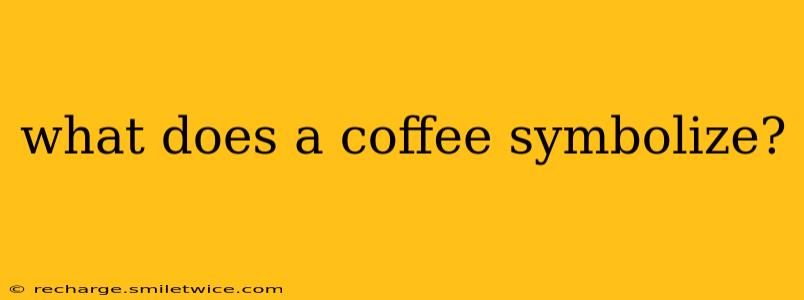What Does a Coffee Symbolize? A Rich Brew of Meanings
Coffee, far beyond its simple role as a morning beverage, carries a rich tapestry of symbolism woven throughout cultures and history. Its meaning shifts subtly depending on context, but several core themes consistently emerge. This exploration will delve into the multifaceted symbolism of coffee, answering common questions and uncovering less-known interpretations.
What are the most common symbolic meanings of coffee?
The most common symbolic associations with coffee revolve around wakefulness, energy, and stimulation. It represents the start of the day, a burst of productivity, and the overcoming of lethargy. The ritual of preparing and consuming coffee often symbolizes comfort, routine, and self-care. For many, it's a cherished moment of quiet reflection or a social lubricant, facilitating connection and conversation.
What does coffee symbolize in literature and art?
In literature and art, coffee frequently symbolizes intellectual stimulation and creativity. Think of the countless depictions of writers hunched over manuscripts, fueled by steaming mugs. It can represent sophistication and social status, particularly in historical contexts where access to coffee was a privilege. Furthermore, the bitter taste can symbolize life's complexities and challenges, while the warmth of the drink suggests comfort and resilience in the face of adversity.
Does the type of coffee affect its symbolism?
Interestingly, the type of coffee can subtly influence its symbolic meaning. A strong, dark espresso might symbolize intensity and power, while a delicate latte could represent gentleness and refinement. The presentation – a simple cup versus an elaborate pour-over – also contributes to the overall symbolism. A meticulously crafted pour-over could symbolize attention to detail and artistry.
What does coffee symbolize in different cultures?
Coffee’s symbolism varies across cultures. In some Middle Eastern and North African countries, coffee holds deep social and ritualistic significance, representing hospitality and generosity. Sharing coffee is a gesture of respect and friendship, integral to social gatherings and ceremonies. In other cultures, coffee might be more strongly associated with professionalism and business, used as a backdrop for negotiations and networking.
What are some less common symbolic meanings of coffee?
Beyond the common interpretations, coffee can also symbolize addiction and dependency. The potent caffeine kick can represent a reliance on external stimulants to navigate daily life. Conversely, the ritual of mindful coffee consumption can also symbolize self-control and discipline. The process of brewing and savoring can be a form of meditation or mindful practice. Finally, the dark, rich color of coffee can even symbolize mystery and intrigue.
Is coffee a symbol of love or romance?
While not as directly associated with romance as flowers or chocolates, coffee can certainly play a supporting role in romantic symbolism. Sharing a cup of coffee with a loved one represents intimacy and shared experiences. The warmth and comfort of the drink can enhance feelings of connection and closeness. It's less about the coffee itself and more about the shared moment.
In conclusion, the symbolism of coffee is multifaceted and deeply rooted in cultural context and personal experience. Its representation ranges from energy and productivity to comfort, connection, and even addiction. Ultimately, the meaning of coffee is as unique and varied as the individuals who drink it.
